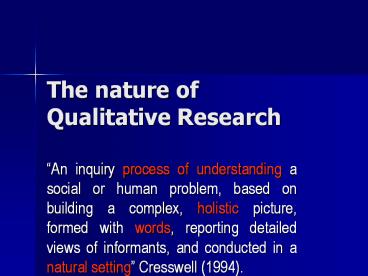The nature of Qualitative Research PowerPoint PPT Presentation
1 / 17
Title: The nature of Qualitative Research
1
The nature of Qualitative Research
- An inquiry process of understanding a social or
human problem, based on building a complex,
holistic picture, formed with words, reporting
detailed views of informants, and conducted in a
natural setting Cresswell (1994).
2
- "any kind of research that produces findings not
arrived at by means of statistical procedures or
other means of quantification" (Strauss and
Corbin, 1990, p. 17).
3
- "the special task of the social scientist in each
generation is to pin down the contemporary facts.
Beyond that, he shares with the humanistic
scholar and the artist in the effort to gain
insight into contemporary relationships" - (Cronbach 1975126)
4
Qualitative researchers
- Advocate a "paradigm of choices" that seeks
"methodological appropriateness as the primary
criterion for judging methodological quality." - allows for a "situational responsiveness" that
strict adherence to one paradigm or another will
not.
5
Paradigm framework
- made up of
- P Philosophy
- O Ontology
- E Epistemology
- M Methodology
6
Scientific paradigm (Quantitative)
- P Scientific materialism
- O Laws of nature
- E Measurable and observable proof
- M Experiment, large scale data collection,
quantitative analysis
7
Humanistic/Post Modern paradigm
- P Homocentric reality as a social construct,
contextual verities - O The nature of the psyche, of perception,
creativity, intelligence - E Self verified evidence, grounded theory,
recorded testimony - M Phenomenology, ethnography, depth interviews
8
Characteristics of Good Qualitative Research
- Design aspects
- Emergent Design
- Design depends on purpose of inquiry
- Natural setting as source of data
- Empathic neutrality
- Human-as-instrument
9
- Exploratory Descriptive focus
- Begin with a single focus
- Interpretive in character
10
Data collection/production aspects
- No strict criteria for sample size
- Attend to the idiosyncratic
- Write persuasively Thick description
- Early and on-going inductive analysis
11
- Research problems framed as open-ended questions
- Judged using special criteria for trustworthiness
- Emphasis on holistic treatment of phenomena
12
- Non-interventionist
- Centrality of interpretation findings are
assertions - Emphasis on emic issues, alternative
interpretations, "multiple realities" expected.
13
Strategic ideals
- Distinction between quantitative qualitative
methods is more a matter of emphasis than of
boundary. - The most important differences in emphasis are
- the distinction between aiming for explanation
and aiming for understanding - the distinction between the personal and the
impersonal role of the researcher.
14
- inquiry for making explanations vs. inquiry for
promoting understanding are epistemologically
quite different - (formalisation of cause effect informal
understandings of experience) - E.g., teaching vs. learning. Preparing to teach
in didactic fashion is different from preparing
experiential opportunities for learners.
15
- Quantitative research aims to improve
theoretical comprehension. - Qualitative research aims to generate
descriptions and situational interpretations of
phenomena for modifying understandings of the
phenomena.
16
Recognition of risks.
- Contributions toward an improved and disciplined
science are slow and tendentious. - New questions more frequent than answers.
- Results pay off little in the advancement of
social practice. - Ethical risks are substantial.
- Cost is high.
17
- Subjectivity not a failing to be eliminated but
an essential element of understanding. - Understanding frequently will be
misunderstanding, by the researchers and by their
readers.

